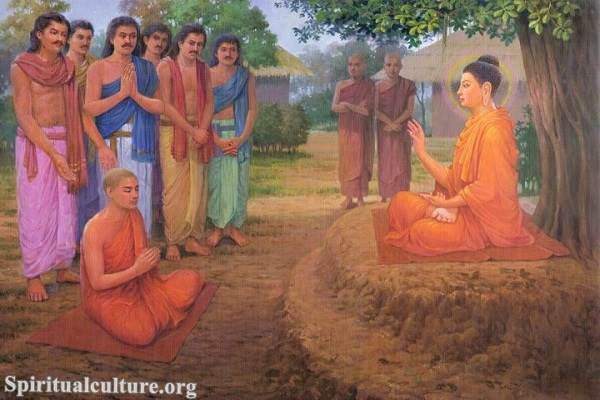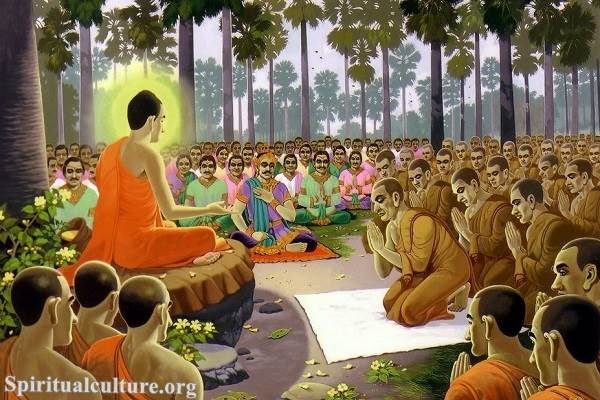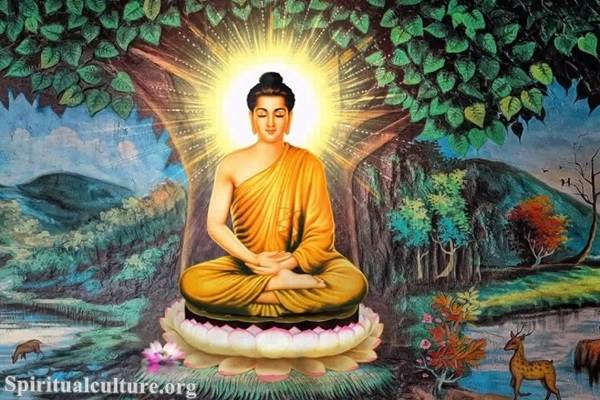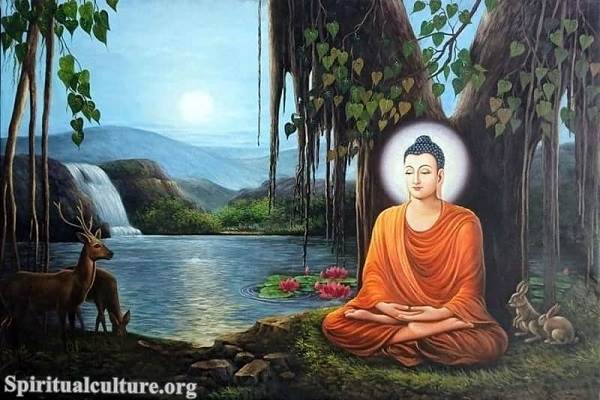After experiencing the world’s suffering and searching for a way to end it, he attained enlightenment and developed the teachings of Buddhism. These teachings, which focus on the Four Noble Truths and the Eightfold Path, provide a path to ending suffering and achieving liberation from the cycle of rebirth. The Buddha spent the rest of his life spreading his teachings and helping people to understand and practice them.
I. History Buddha – Founder of Buddhism
Siddhartha Gautama was born into a royal family in Lumbini, Nepal, in the 6th century BCE. According to tradition, he was born under a tree and was protected from the sun by a canopy of flowers. At his birth, it is said that seers predicted that he would either become a great king or a spiritual leader.
As a young man, Siddhartha lived a life of luxury and indulgence, sheltered from the suffering and hardships of the world outside the palace walls. However, at the age of 29, he decided to leave behind his privileged life and embark on a spiritual journey. He left the palace and began to seek out spiritual teachers, learning about various philosophical and spiritual practices of the time.
After years of seeking, Siddhartha eventually sat down under a tree, now known as the Bodhi tree, and vowed not to rise until he had attained enlightenment. After 49 days of meditation, he attained a profound realization and became the Buddha, or the “Awakened One.”

The Buddha then spent the rest of his life traveling and teaching, sharing his insights and knowledge with others. His teachings, known as the Dharma, were based on the Four Noble Truths: that suffering exists, that suffering arises from craving and attachment, that suffering can be overcome, and that the path to the end of suffering is the Eightfold Path.
The Buddha’s teachings were revolutionary for their time and continue to be a source of inspiration and guidance for people worldwide today.
II. The Buddha’s teachings
The Buddha’s teachings emphasized the importance of understanding the true nature of reality to end suffering. He taught that all phenomena are impermanent and that attachments to fleeting things ultimately lead to suffering. He also taught that there is no permanent self or soul and that the concept of self is actually a source of suffering.
The Buddha’s teachings also emphasized the importance of ethical conduct and mindfulness in one’s daily life. He taught that by following the Eightfold Path, which includes right understanding, intention, speech, action, livelihood, effort, mindfulness, and concentration, one can develop wisdom, compassion, and inner peace.
The Buddha’s teachings were passed down orally through the centuries and were eventually written down in texts known as sutras. These texts were later translated into various languages and spread throughout Asia, helping to establish Buddhism as a major world religion.

Today, there are millions of Buddhists around the world who follow the teachings of the Buddha and seek to understand the nature of reality and end suffering in their own lives.
In addition to his teachings on the Four Noble Truths and the Eightfold Path, the Buddha also taught about the concept of dependent origination, which holds that all phenomena arise in dependence upon other phenomena. This means that nothing exists in isolation and that everything is interconnected.
The Buddha also taught about the concept of karma, which is the law of cause and effect. According to this teaching, one’s actions, thoughts, and words have consequences that can shape one’s present and future experiences. The Buddha taught that by understanding and practicing the principles of karma, one can work towards creating positive experiences for oneself and others.
The Buddha’s teachings also emphasize the importance of compassion and loving-kindness towards all beings. He taught that cultivating compassion and loving-kindness can reduce suffering and bring about a sense of peace and well-being.
The Buddha’s teachings have been interpreted and practiced in many different ways over the centuries. Buddhism now has various schools and traditions that follow different interpretations of his teachings. However, all of these traditions seek to understand and apply the Buddha’s teachings to bring about an end to suffering and the attainment of enlightenment.
III. Common questions about Buddha
1. Who is Buddha?
Buddha is the title given to the founder of Buddhism, Siddhartha Gautama. He is also known as the “Awakened One” or “Enlightened One” because he is believed to have attained enlightenment, or understanding of the true nature of reality, through his own efforts and meditation.
According to traditional accounts, Siddhartha was born in the 6th century BCE in present-day Nepal. He lived as a prince until he renounced his royal life and became a wandering ascetic in search of spiritual truth.
After many years of meditation and self-denial, he achieved enlightenment under a tree. He spent the rest of his life teaching others the path to enlightenment he had discovered. His teachings and the philosophy he developed are known as Buddhism, and they have profoundly influenced the spiritual and cultural development of Asia and the world.
2. Where did Buddhism originate, and who was its founder?
Buddhism originated in ancient India, and its founder was Siddhartha Gautama, who later became known as the Buddha. The Buddha was born in the fifth century BCE in the small kingdom of Kapilavastu, which is now Nepal. He was the son of a wealthy ruler, but he renounced his privileged life and became a spiritual seeker. After many years of meditation and spiritual practice, he achieved enlightenment and began teaching others what he had learned. His teachings, known as the Dharma, became the foundation of Buddhism.
3. When was Buddhism founded?
Buddhism was founded by Siddhartha Gautama, also known as the Buddha, in the 5th century BCE. The Buddha was born in Lumbini, in modern-day Nepal, and lived in the eastern part of the Indian subcontinent. He is revered as the founder of Buddhism because he is considered to have attained enlightenment, or nirvana, and to have taught a path to enlightenment that others could follow. The teachings of the Buddha, known as the Dharma, are believed to be a means to end suffering and achieve enlightenment.
4. Was Buddha a real person?
Buddha was a real person. He was an Indian prince named Siddhartha Gautama who lived approximately 2,500 years ago. According to Buddhist tradition, he was born in Lumbini, in present-day Nepal, and grew up in the Shakya kingdom, where he eventually became the spiritual leader known as the Buddha and founded the Buddhist religion.
5. How did the founder of Buddhism die?
The founder of Buddhism, Siddhartha Gautama, also known as the Buddha, died at the age of 80. The cause of his death is not specifically mentioned in the Buddhist scriptures, but it is believed that he died of old age.
According to tradition, the Buddha died in the town of Kusinara in what is now modern-day Uttar Pradesh, India. After his death, his remains were cremated, and the ashes were divided among his followers, who built stupas to enshrine the ashes. These stupas became important pilgrimage sites for Buddhists, and they continue to be so to this day.
6. How did Buddha die?
The Buddha, whose name was Siddhartha Gautama, is said to have died at the age of 80. According to tradition, he died of natural causes, although there are some stories that suggest he may have been poisoned. After his death, the Buddha’s remains were cremated, and the ashes were divided among his followers, who enshrined them in stupas. The Buddha’s teachings and philosophy continue to influence millions of people worldwide to this day.
7. What did Buddha say about death?
Buddha’s teachings about death are rooted in the understanding that death is an inherent part of the cycle of life and that it is not something to be feared. According to Buddha, death is simply a transformation and a passing from one phase of life to the next. He taught that the ultimate goal of life is to end the cycle of death and rebirth and to attain the state of nirvana, which is a state of peace and enlightenment.
In the Buddhist tradition, it is believed that one’s actions in life (known as “karma”) have an impact on what happens after death and on one’s future rebirth. Buddha taught that by practicing the Eightfold Path and developing mindfulness and wisdom, one can improve one’s karma and increase the likelihood of being reborn in a better state.
Overall, Buddha’s teachings about death emphasize the importance of living a virtuous and mindful life and of letting go of attachments and desires. They offer a framework for understanding life’s impermanent nature and finding peace and acceptance in the face of death.
8. Does Buddha believe in god?
Buddhism does not focus on the belief in a personal God or deity in the way that some other religions do. The Buddha taught that the concept of a divine being who created and controls the universe is not necessary for understanding the truth about the nature of reality and how to live a meaningful life. Instead, Buddhism emphasizes understanding the true nature of the self and the world through mindfulness and practicing certain ethical principles, such as the Four Noble Truths and the Eightfold Path.
9. What did Buddha say about god?
The Buddha did not teach about a personal God, or deity like many religions do. Instead, he taught about the concept of dharma, which can be translated as “truth,” “law,” or “natural order.” The Buddha believed that understanding and living in accordance with dharma was the key to ending suffering and achieving enlightenment.
In the Buddha’s teachings, there is no place for the idea of a creator God who is separate from the world and intervenes in the affairs of human beings. Instead, the Buddha taught that all phenomena arise due to causes and conditions and that individuals can awaken to the true nature of reality through their efforts and understanding.
So while the Buddha’s teachings do not specifically address the concept of a God in the way that many people understand it, they offer a path for individuals to understand and experience a deeper truth and find meaning and purpose in their lives.
10. What are the characteristics of Buddha?
The Buddha, or the “Awakened One,” was a spiritual teacher who lived in ancient India and is the founder of Buddhism. Some of the most important characteristics of the Buddha include:
- Compassion: The Buddha was known for his boundless compassion for all beings and his desire to help them achieve enlightenment.
- Wisdom: The Buddha gained profound insights into the nature of reality and the human condition through meditation and self-reflection.
- Non-violence: The Buddha taught non-violence, love, and kindness towards all beings, including one’s enemies.
- Modesty: Despite his spiritual attainments, the Buddha was always humble and never considered himself superior to others.
- Ethics: The Buddha taught a strict code of ethics, including the importance of honesty, generosity, and harmlessness.
- Detachment: The Buddha taught that attachment to material things and desires was a source of suffering, and that true happiness could only be found through detachment and inner peace.




